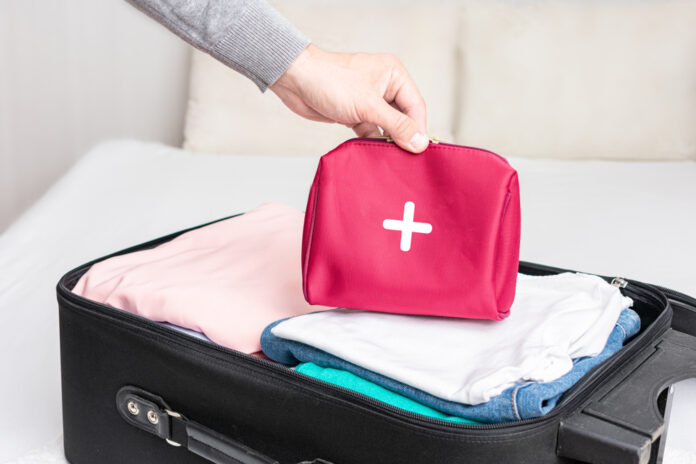Medicines To Carry While Travelling in India
Traveling in India is an exciting and enriching experience, offering a blend of diverse cultures, landscapes, and historical wonders. However, to ensure a smooth and enjoyable journey, it’s crucial to be prepared for any health-related challenges that may arise. Carrying a well-stocked travel medicine kit can make all the difference in ensuring your well-being during your Indian adventure. In this blog post, we’ll provide you with a comprehensive list of essential medicines to carry while traveling in India.
Also Read: Top Travel Safety Tips: Keeping Yourself and Your Belongings Secure
Basic Travelers First Aid Kit Supplies:
- Adhesive bandages: For minor cuts and abrasions.
- Sterile gauze and adhesive tape: To dress wounds and stop bleeding.
- Antiseptic wipes or solution: To clean wounds and prevent infections.
- Tweezers and small scissors: For removing splinters or cutting bandages.
- Instant cold packs: To reduce swelling or soothe minor injuries.
Pain Relief Medicine for Traveling
- Acetaminophen (Paracetamol): A common over-the-counter pain reliever and fever reducer.
- Ibuprofen: Helps alleviate pain, inflammation, and fever.
- Aspirin: Useful for mild pain relief and can also act as a blood thinner.
Travel medicine kit list for Digestive Health:
- Antacids: For relief from indigestion or heartburn.
- Anti-diarrheal medication: Imodium or similar medications to manage sudden bouts of diarrhea.
- Oral rehydration salts (ORS): Essential for rehydrating after episodes of diarrhea to prevent dehydration.
- Probiotics: To maintain a healthy balance of gut bacteria and aid digestion.
Travel Medical Kit Checklist
Medicines to carry while travelling to hill station:
- Dimenhydrinate (Dramamine) or Meclizine: Prevents and treats motion sickness during long journeys.
Medicine for Allergies:
- Antihistamines: For relief from allergy symptoms such as itching, sneezing, and congestion.
Respiratory Health:
- Decongestant nasal spray or tablets: To relieve nasal congestion.
- Cough drops or lozenges: Soothe a sore throat or cough.
- Inhaler (if prescribed): For those with asthma or respiratory conditions.
Fever and Infections:
- Antibacterial ointment: For treating minor cuts and preventing infection.
- Thermometer: To monitor your body temperature in case of fever.
Insect Protection:
- Insect repellent with DEET: Protects against mosquitoes and other biting insects.
- Antihistamine cream or tablets: To relieve itching from insect bites.
Sun Protection:
- Sunscreen with high SPF: Protects against the intense Indian sun.
- Aloe vera gel: Soothes and cools sunburned skin.
Hydration:
- Reusable water bottle: To stay hydrated, especially in hot climates.
- Oral rehydration solution (electrolyte packets): Replenishes fluids and electrolytes in case of dehydration.
Prescription Medications:
- Carry an ample supply of any prescribed medications you currently take.
- Keep a copy of your prescriptions and a note from your doctor explaining your medical condition, especially if you have chronic illnesses.
Emergency Medications:
- Epinephrine auto-injector (if you have severe allergies).
- Any other emergency medications prescribed by your healthcare provider.
Personal Health and Hygiene Items:
- Hand sanitizer: To maintain hand hygiene when soap and water are not available.
- Personal hygiene products: Carry any specific items you may need for your daily routine.
Medical Documentation:
- Carry a small medical kit with a copy of your health insurance details, emergency contact numbers, and a list of allergies or medical conditions.
Remember that medical care and access to specific medications may vary across different regions in India. It’s advisable to consult your healthcare provider before your trip to discuss any potential health concerns and to ensure that you are adequately prepared. Additionally, be aware of the expiration dates of the medications in your travel kit, and replace them as needed.
Conclusion
Traveling in India can be a transformative experience, but being proactive about your health is crucial to making the most of your journey. By packing a well-thought-out travel medicine kit, you equip yourself to handle common health issues that may arise during your travels. Stay prepared, stay healthy, and enjoy the beauty and diversity that India has to offer.
Disclaimer
The information provided in this blog is for general informational purposes only and is not a substitute for professional medical advice. Consult with your healthcare provider before using any medications or implementing health recommendations mentioned in the blog. Individual health conditions vary, and self-diagnosis and self-medication can have serious consequences. Medications should be used on the advice of a doctor or qualified healthcare professional. Always seek professional medical advice for your specific needs and conditions.





